England v San Marino: How do you improve world’s worst national team?
San Marino #SanMarino

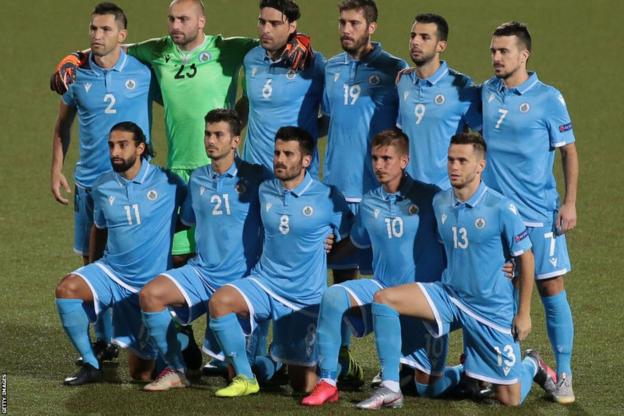 San Marino have drawn two of their last three games
San Marino have drawn two of their last three games
There have been few moments of pride in San Marino’s football history.
It is, admittedly, a relatively short history.
Although its football federation (FSGC) was founded in 1931, San Marino only received affiliation to Fifa and Uefa in 1988 and its national team’s first official game took place in November 1990.
With a population of around 30,000, the microstate on the hills above the Italian Riviera has a tiny pool of potential players.
The FSGC can count around 1,800 registered players, among them players from futsal, youth, female and male football, compared to more than 14 million registered by the Football Association of England, external-link who they meet at Wembley on Thursday in a World Cup qualifier.
As of today, out of the 450 players taking part in their 15-club non-professional league, only 100 are in possession of a San Marino passport and fewer than a handful play in the lower leagues of Italian professional football.
The result of all these pessimistic stats is the worst Fifa ranking in the world, external-link behind the likes of Anguilla, the British Virgin Islands and the US Virgin Islands.
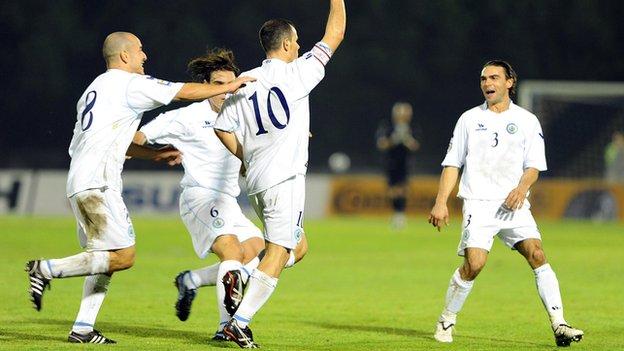 San Marino has one win and six draws in the last 31 years
San Marino has one win and six draws in the last 31 years
“Football has always had a social aspect for the people here,” says Andy Selva, San Marino’s all-time most-capped player and most prolific scorer with 73 appearances and eight goals, including one which secured their only win, in a friendly against Liechtenstein on 28 April 2004. external-link
He believes the population see the national team as something to enjoy, rather than live and breathe, which has affected the evolution of the side.
“What we lack are technical, tactical and managerial knowledge, which would allow us to improve the overall quality of our football,” says Selva.
And although it’s not easy with limited resources, the FSGC started the process of trying to fill those voids with the appointment of Franco Varrella in January 2018.
Varrella is a well-travelled manager across Italy, so how is he trying to do the impossible and attempt to make minnows San Marino a competitive force?
‘Playing Germany or England was a reason for exchanging shirts’ 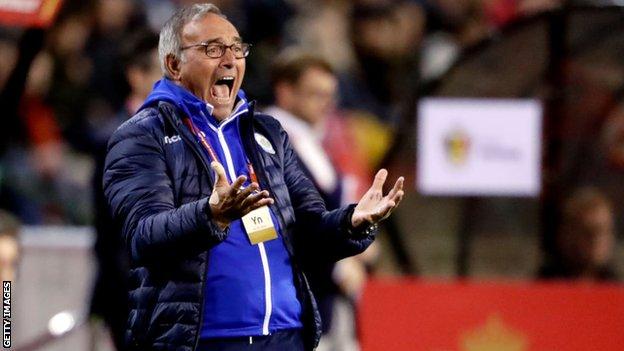 Franco Varrella has drawn two and lost 20 of his 22 games in charge of San Marino
Franco Varrella has drawn two and lost 20 of his 22 games in charge of San Marino
Despite being born just 20km away in Rimini, Varrella is a man you would not expect in San Marino.
He has managed important Serie B clubs such as Brescia, Salernitana, Reggiana, Triestina and Ravenna, he was Arrigo Sacchi’s assistant with Italy during Euro 96 in England and is a teaching staff member at Coverciano, Italy’s central training centre.
But he is in San Marino, and the signs of progress are there. San Marino drew their final two Nations League games 0-0 last year, against Gibraltar and Lichtenstein. external-link It is a notable feat for a team that has lost all but seven – including one win – of its games in the last 31 years.
“I have been here for almost four years now and things have changed for the better,” he says, smiling.
“First of all, we instilled a new sense of identity and belonging. We represent our country, which is small, but it has to be important for us.
“Since not long ago, playing Germany, England or Spain was a reason for exchanging shirts at half-time. This has changed now. We give our all to the very end, and the rest can come afterwards. In fact, the biggest improvement was in terms of mentality.”
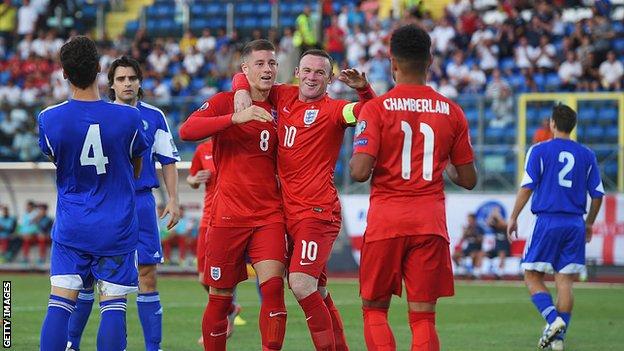 England last played San Marino in a Euro 2016 qualifier in 2015, a game the Three Lions won 6-0
England last played San Marino in a Euro 2016 qualifier in 2015, a game the Three Lions won 6-0
Essential as it is, mentality alone cannot possibly bridge the gap to professional players who train in state-of-the-art complexes several times a week and don’t earn their money as electricians or mechanics.
“We also meet up more often for camps; it is important to build a group spirit. This allowed them to develop from a technical and tactical point of view too,” says Varrella, who takes advantage of his connections at Coverciano to provide teaching for his coaches.
On top of that, he has insisted San Marino’s youth teams adopt the same tactics as the senior side in order to create consistency.
“I will coach the national team until the end of the Fifa World Cup qualifying campaign,” he says.
“But I will stay for longer to bring this process to an end. I am sure the new technical director Daniele Arrigoni [the former Palermo and Livorno boss], who has a lot of Serie A and B experience, will help us a lot.”
Backing from a hero 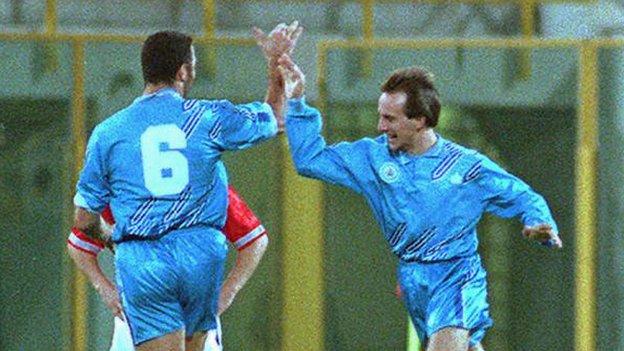 Davide Gualtieri scored a memorable goal against England in 1994
Davide Gualtieri scored a memorable goal against England in 1994
Davide Gualtieri is a household name for those who love the game in San Marino.
In fact, set at 6.3 seconds, he held the record for the fastest goal in a Fifa competition for over two decades.
On that day in 1994, England took to the pitch in Bologna against San Marino and straight from kick-off, Stuart Pearce under-hit a pass-back. The then 22-year-old striker squeezed in to beat David Seaman and shock an entire nation. England eventually won 7-1, but his mark was made.
“Now I work in the IT sector, the FSGC is a customer of mine and I set up the wi-fi network at the Serravalle stadium for them,” he tells us.
He has witnessed San Marino’s progression under Varrella and the benefit of a new pitch at Serravalle from Uefa’s investment in the last Euro Under-21 championship, which was hosted with Italy.
“The turf is like a billiard table now,” says Gualtieri.
“We received compliments from journalists, teams and authorities, which is the evidence of a good job for such a small country.”
A second pitch is now being built now, as well as a brand-new futsal arena.
“Serravale is growing into a nice sports complex, which is essential for the development of our movement,” the now San Giovanni futsal coach adds.
‘It looks like they are doing San Marino a favour’
Nevertheless, there is still a long way to go. Infrastructures at club level are not always state of the art and the FSGC executive board does not include any ex-players or coaches.
“We are the only association in Europe to do so, and this is more than a shame,” complains Selva, who is now managing Pennarossa in the local league.
“We could help out with proper planning and lay the foundations for future success.”
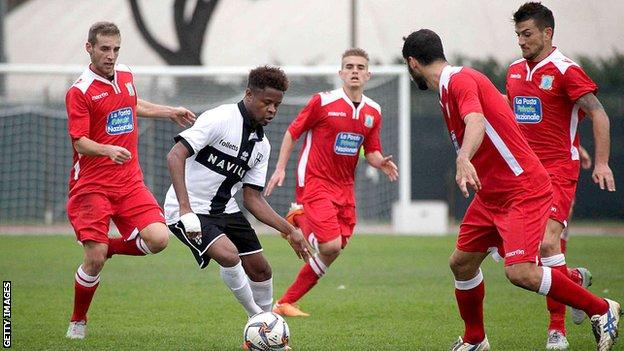 San Marino Calcio, in red, was dissolved two years ago
San Marino Calcio, in red, was dissolved two years ago
Gualtieri is also adamant something needs to be changed and that a new perspective is necessary, particularly after the dissolution of the country’s only club to compete in the Italian leagues, San Marino Calcio, two years ago.
“It’s hard for our local players to develop in such a non-competitive league,” he says.
“This leads to them losing interest. Sometimes it looks like they are doing San Marino a favour when they get called up. That was definitely not the case in my time.”
So, for all the progress, it still looks like the journey will be a long and slow one for FSGC’s board of directors and their man from Rimini.

